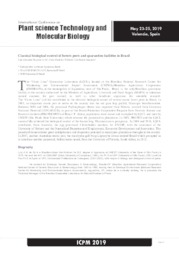Classical biological control of forests pests and quarantine facilities in Brazil.
Classical biological control of forests pests and quarantine facilities in Brazil.
Author(s): SA, L. A. N. de; WILCKEN, C. F.; JUNQUEIRA, L. R.
Summary: The "Costa Lima" Quarantine Laboratory (LQCL), located at the Brazilian National Research Center for Monitoring and Environmental Impact Assessment (CNPMA)/Brazilian Agricultural Corporation (EMBRAPA), in the municipality of Jaguariúna, state of São Paulo, Brazil is the only Brazilian quarantine facility in the country authorized by the Ministry of Agriculture, Livestock and Food Supply (MAPA) to introduce natural enemies for pest control, as well as other beneficial organisms for scientific research.The ?Costa Lima? Lab has contributed to the classical biological control of several exotic forest pests in Brazil. In 2003, an important exotic pest to arrive in the country was the red gum lerp psyllid, Glycaspis brimblecombei. Between 2004 and 2006, the parasitoid Psyllaephagus bliteus was imported from Mexico, sourced from Comisión Nacional Florestal (CONAFLOR), as part of the Forest Protection Cooperative Program from Forestry Science and Research Institute (PROTEF/IPEF) of Brazil. P. bliteus populations were reared and multiplied by LQCL and later by UNESP (São Paulo State University) which released the parasitoid in plantations. In 2008, PROTEF and the LQCL successfully achieved the biological control of the bronze bug, Thaumastocoris peregrinus. In 2009 and 2010, LQCL introduced, from Australia, the egg parasitoid, Cleruchoides noackae, for UNESP, with the assistance of the University of Sydney and the Queensland Department of Employment, Economic Development and Innovation. This parasitoid demonstrated great multiplication and dispersion potential in eucalyptus plantations throughout the country. In 2007, another Australian exotic pest, the eucalyptus gall wasp Leptocybe invasa entered Brazil which prompted us to introduce another parasitoid, Selitrichodes neseri, from the University of Pretoria, South Africa, in 2015.
Publication year: 2019
Types of publication: Abstract in annals or event proceedings
Unit: Embrapa Environment
Keywords: Biological control, Controle Biológico, Floresta, Peste, Quarantine, Quarentena
Observation
Some of Embrapa's publications are published as ePub files. To read them, use or download one of the following free software options to your computer or mobile device. Android: Google Play Books; IOS: iBooks; Windows and Linux: Calibre.
Access other publications
Access the Agricultural Research Database (BDPA) to consult Embrapa's full library collection and records.
Visit Embrapa Bookstore to purchase books and other publications sold by Embrapa.

